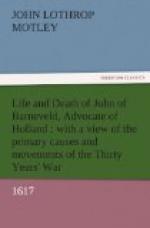They decided by a majority vote that the Resolution ought not to be obeyed, but set aside. Amsterdam, and the three or four cities usually acting with her, refused to enlist troops.
Rombout Hoogerbeets, a member of the tribunal, informed Prince Maurice that he “would no longer be present on a bench where men disputed the authority of the States of Holland, which he held to be the supreme sovereignty over him.”
This was plain speaking; a distinct enunciation of what the States’ right party deemed to be constitutional law.
And what said Maurice in reply?
“I, too, recognize the States of Holland as sovereign; but we might at least listen to each other occasionally.”
Hoogerbeets, however, deeming that listening had been carried far enough, decided to leave the tribunal altogether, and to resume the post which he had formerly occupied as Pensionary or chief magistrate of Leyden.
Here he was soon to find himself in the thick of the conflict. Meantime the States-General, in full assembly, on 11th November 1617, voted that the National Synod should be held in the course of the following year. The measure was carried by a strict party vote and by a majority of one. The representatives of each province voting as one, there were four in favour of to three against the Synod. The minority, consisting of Holland, Utrecht, and Overyssel, protested against the vote as an outrageous invasion of the rights of each province, as an act of flagrant tyranny and usurpation.
The minority in the States of Holland, the five cities often named, protested against the protest.
The defective part of the Netherland constitutions could not be better illustrated. The minority of the States of Holland refused to be bound by a majority of the provincial assembly. The minority of the States-General refused to be bound by the majority of the united assembly.
This was reducing politics to an absurdity and making all government impossible. It is however quite certain that in the municipal governments a majority had always governed, and that a majority vote in the provincial assemblies had always prevailed. The present innovation was to govern the States-General by a majority.
Yet viewed by the light of experience and of common sense, it would be difficult to conceive of a more preposterous proceeding than thus to cram a religious creed down the throats of half the population of a country by the vote of a political assembly. But it was the seventeenth and not the nineteenth century.
Moreover, if there were any meaning in words, the 13th Article of Union, reserving especially the disposition over religious matters to each province, had been wisely intended to prevent the possibility of such tyranny.
When the letters of invitation to the separate states and to others were drawing up in the general assembly, the representatives of the three states left the chamber. A solitary individual from Holland remained however, a burgomaster of Amsterdam.




